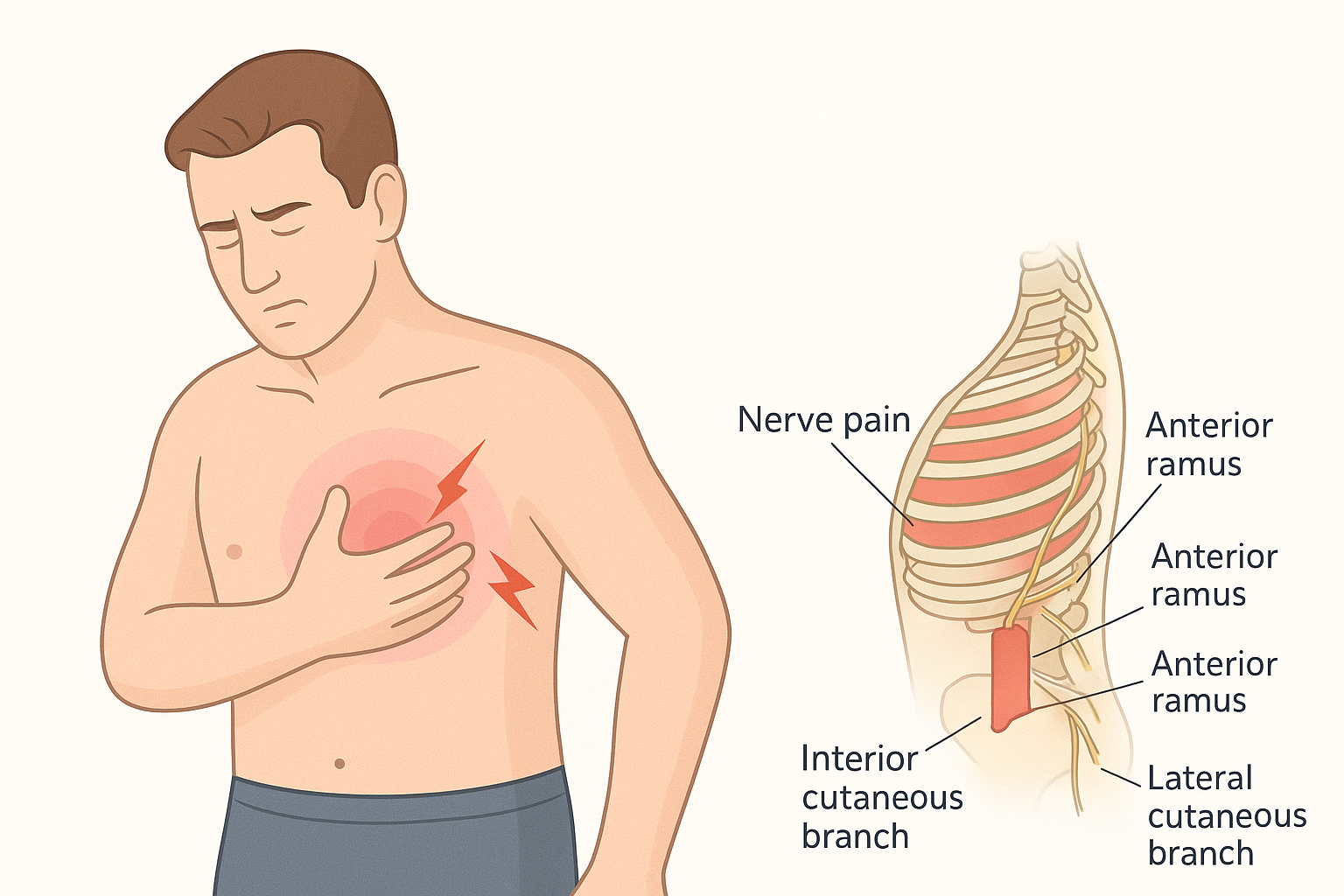Have you ever experienced a sharp, burning, or stabbing pain that seems to wrap around your ribs, the kind of discomfort that takes your breath away with just a cough or sneeze? A pain that feels like that makes you wonder if it’s related to your heart? Many people describe this as nerve pain in the chest, and it can be scary, often making you think it’s related to your heart or lungs. In many cases, though, the culprit is something called intercostal neuralgia, a type of nerve pain that comes from irritation or inflammation of the nerves running between your ribs.
Chest or rib cage pain is always concerning, often raising immediate fears about the heart or lungs. While it’s essential to rule out those emergencies, nerve-related pain between the ribs is actually a surprisingly common cause of these symptoms.
In this article, we’ll explain what intercostal neuralgia is, why it causes nerve pain in the chest, how serious it can be, and the treatment options available to help you find relief and feel better.
In our previous blog about intercostal neuralgia, we covered what is intercostal neuralgia, causes, treatment options, symptoms and diagnosis. If not read, visit to read more about intercostal neuralgia, its causes, symptoms, treatment options and diagnosis. .
For those new to the topic, here’s a quick overview of what intercostal neuralgia is.
Know about Intercostal Neuralgia?
Intercostal neuralgia is a specific medical term for a type of neuropathic pain in chest. It affects the intercostal nerves, which run between your ribs, helping you sense feeling in your chest wall and powering the muscles that allow you to breathe.
Think of these nerves like electrical wires housed in the grooves between your ribs. When one of these wires becomes compressed, inflamed, or injured, it can send faulty, painful signals to your brain. This results in the characteristic band-like pain between ribs that defines this condition. Essentially, intercostal neuralgia is the clinical diagnosis for a specific pattern of nerve pain in chest.
Why Does Intercostal Neuralgia Cause Nerve Pain in the Chest?
Your intercostal nerves extend from the spinal cord and travel between each rib. When these nerves are irritated, you can feel pain across the chest wall and sometimes into the back.
Common causes of intercostal neuralgia include:
- Injury or trauma – accidents, falls, or rib fractures.
- Surgery – procedures like thoracic or cardiac surgery can irritate intercostal nerves.
- Inflammation or infection – shingles (post-herpetic neuralgia) is a well-known trigger.
- Nerve compression – due to spinal conditions, muscle tightness, or structural issues..
This explains why nerve pain in the chest can be felt so differently from muscle soreness or cardiac discomfort—it directly follows the nerve’s pathway.
Is Nerve Pain in the Chest Always Serious? The Reality Check.

First, and most importantly: intercostal neuralgia is generally not life-threatening. The nerve pain in chest itself does not directly cause heart attacks, pulmonary embolisms, or other critical organ failures. This is the key piece of reassurance many people need.
However, the seriousness of intercostal neuralgia is measured by its impact on your quality of life. The pain can be excruciating and debilitating. It can disrupt your sleep, make it difficult to work or exercise, and lead to significant anxiety and stress. The constant, stabbing nerve pain in the chest wall can make every deep breath or simple twist of the torso a challenge.
Furthermore, the underlying cause of the nerve irritation can range from minor to serious. This is why getting a professional diagnosis is non-negotiable. While often caused by shingles nerve pain (postherpetic neuralgia) or a simple muscle strain, it can rarely be a sign of something more significant.
Treatment Options for Relief from Intercostal Neuralgia
Managing nerve pain in the chest requires a combination of medical care, pain management techniques, and sometimes interventional procedures.
Finding relief from nerve pain in the chest often requires a personalized approach. Because the pain can stem from multiple causes such as nerve irritation, surgery, or injury, treatments are designed to not only ease discomfort but also target the root problem. Here are the most effective options:
1. Medications for Initial Relief
Doctors often begin with medications to control inflammation and nerve-related pain.
- Anti-inflammatory medications (NSAIDs) to calm irritation.
- Nerve pain medicines like gabapentin or pregabalin, which specifically target nerve sensitivity.
- Muscle relaxants if chest wall spasms contribute to discomfort.
Best for: short-term relief or mild-to-moderate symptoms.
2. Physical Therapy and Lifestyle SupportSyndrome
Restoring mobility and improving rib cage function can make a big difference.
- Gentle stretching to reduce stiffness.
- Breathing exercises that strengthen rib muscles without straining them.
- Postural training to avoid nerve compression from slouching or poor alignment.
Best for: patients looking to reduce flare-ups and prevent recurrence.
3. Injection-Based Therapies
For pain that doesn’t improve with basic treatments, targeted injections can bring significant relief.
Intercostal Nerve Blocks – deliver medication directly to the irritated nerves.
Medial Branch Blocks (MBB) – help diagnose and relieve pain that comes from spinal facet joints connected to rib nerves.
(Explore more on our Injection Therapies )
Best for: patients with moderate-to-severe pain needing fast, localized relief.
4. Radiofrequency Ablation (RFA)
When nerve blocks provide only temporary relief, RFA is often the next step. This minimally invasive procedure uses heat to “quiet” the pain signals traveling through the affected nerves, offering longer-lasting results.
Learn more on our RFA Treatment
Best for: patients with chronic intercostal neuralgia who want months of pain relief without major surgery.
5. Advanced Neuromodulation Procedures
For patients with persistent pain, advanced therapies may be recommended:
Peripheral Nerve Stimulation (PNS) – small electrodes are placed near the irritated nerves to block pain signals.
Spinal Cord Stimulation (SCS) – modifies how pain is processed in the spinal cord, reducing intensity.
Read about our Advanced Nerve Procedures
Best for: patients with severe, long-term chest nerve pain who haven’t responded to other treatments.
By working closely with a Pain and Spine Management specialist in Washington, you’ll receive a treatment plan customized to your pain, helping you move beyond pain and back to the activities you love.
When to See a Doctor: Red Flag Symptoms
While intercostal neuralgia itself isn’t an emergency, you should always seek immediate medical attention if your chest pain is accompanied by:
- Crushing pressure or pain radiating to your jaw, neck, or arm.
- Severe shortness of breath.
- Dizziness, cold sweats, or nausea.
- These could signal a heart attack.
Living With Intercostal Neuralgia, a Self-Care Tips
Along with medical treatments, some lifestyle adjustments can help minimize pain flare-ups:
- Apply heat or cold packs to soothe irritation
- Avoid sudden twisting, heavy lifting, or strenuous activity
- Practice deep breathing exercises to improve rib mobility
- Try relaxation techniques (meditation, yoga, gentle stretching)
Conclusion
Intercostal neuralgia may not be life-threatening, but it is a serious cause of nerve pain in the chest that deserves proper attention. With timely diagnosis, treatment options like nerve blocks, MBB injections, or RFA, and supportive self-care, patients can find lasting relief and reclaim their quality of life.
If you’re struggling with persistent rib or chest nerve pain, don’t wait. Schedule a consultation with our specialists today to explore the best treatment option for you.
Disclaimer: This article is for informational purposes only and does not constitute medical advice. Always consult with a qualified healthcare professional for diagnosis and treatment of medical conditions.


